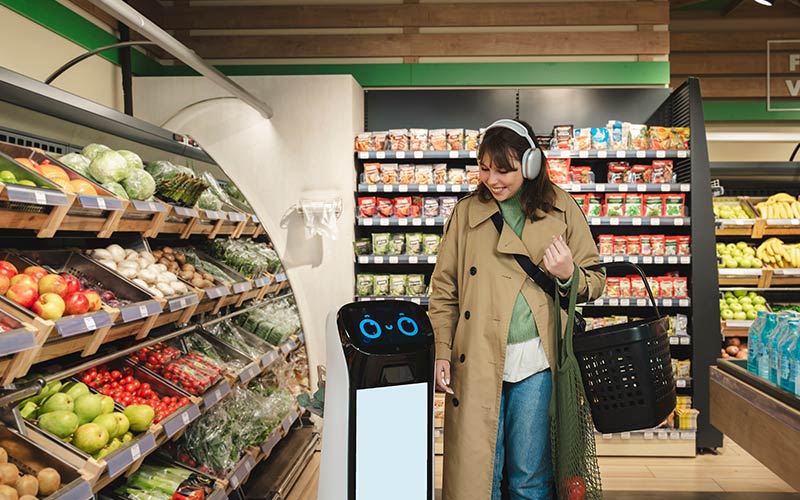
Insights
- CMOs in retail increasingly exert more influence over customer experience and technology investment decisions.
- A large majority of retail respondents (61%) report using artificial intelligence (AI) across at least five of the seven marketing activities that we surveyed.
- Marketing leaders expect that efficiency, speed to market, and productivity will be the most significant benefits of AI in the next 18 months.
- For marketers in the retail sector, the most significant barriers to AI adoption are data privacy and security, regulatory concerns, and integration with existing technology.
Infosys conducted a survey in 2024 to understand how CMOs are using artificial intelligence (AI) to create value and adapt to their evolving roles. The research includes responses from 2,600 marketing leaders in five countries or regions and 14 industries:
- Automotive
- Consumer packaged goods
- Energy, mining, and utilities
- Financial services
- Healthcare
- High tech
- Insurance
- Life sciences
- Logistics
- Manufacturing
- Professional services
- Retail
- Telecommunications
- Travel and hospitality
Over the past decade, marketers have relied on AI to automate repetitive tasks and quickly respond to customer needs. Recent advances, particularly in generative AI, have expanded how CMOs can use this technology, enabling them to move beyond data analytics and classification and into more creative tasks. However, the potential of AI in marketing is still just potential for many CMOs. This data book explores the ways the retail sector is adopting AI, the value it delivers, how marketing leaders can increase their chances of creating value through AI, and the challenges the sector still faces.
AI adoption widespread and deeply integrated
A large majority of the 251 respondents in retail say they have deployed AI at scale for the seven core marketing activities that we surveyed (Figure 1). The deployment of AI in these critical areas — from content creation to e-commerce personalization to managing advertising spending — is fairly evenly distributed. Roughly one-quarter are still in the proof-of-concept or pilot stages for these marketing activities.
These findings suggest that CMOs recognize AI's vast potential, from increasing efficiency through automation to enhancing human creativity. In addition, marketers are finding it easier now to incorporate AI into their work. A 2023 report said that more than 2,000 MarTech tools were released in the previous six months, with nearly three-quarters of them AI-powered.
Figure 1. AI adoption in retail
Source: Infosys Knowledge Institute
CMO Radar shows that marketing leaders are not just using AI in selected areas but embracing it across the board. In the retail sector, 61% of respondents say they have deployed AI in five to seven marketing activities (Figure 2). Managing ad spending, content creation, website or e-ecommerce personalization, and campaign management are the dominant areas.
Figure 2. Most marketers have deployed AI in five or more marketing activities
Source: Infosys Knowledge Institute
Retail CMOs have deeply embedded AI into three key areas we surveyed: campaign management, personalization, and content creation (Figure 3). AI helps CMOs develop needed insights quickly — often in real time — and scale up execution based on those insights.
These figures do not indicate that AI fully manages or generates more than half of this work; instead, they highlight its critical role in accelerating and improving these efforts.
Figure 3. Marketing activities where AI is used extensively
Source: Infosys Knowledge Institute

More AI leads to more value
Since the arrival of generative AI, CMOs have rapidly and comprehensively embraced this technology. Findings from CMO Radar reveal that retail CMOs are more likely to deploy AI at scale for important marketing activities than limit its use to proofs of concept. This assertive strategy has delivered results.
Overall, retail CMOs achieve greater success when they use AI for marketing activities more often. Among those deploying AI across all seven activities, 76% report that a majority of their implementations deliver business value (Figure 4). Similarly, nearly two-thirds (63%) of CMOs deploying AI in six activities succeed in at least half their efforts. With a single exception, marketing leaders who deploy AI less frequently experience lower success rates.
Figure 4. CMOs benefit from broader use of AI
Source: Infosys Knowledge Institute
Marketers predict that in the next 18 months, efficiency, speed to market, and productivity will be the areas where they see the most significant benefits from AI initiatives (Figure 5). These are also the same areas where they have seen the most benefits so far — primarily cost reductions and the streamlining of processes.
Retail CMOs do not expect that AI will provide much additional benefit in the future for e-commerce. Digital-native companies and massive brick-and-mortar chains have already created mature AI-powered recommendation engines in addition to some dynamic pricing systems and augmented reality tools. However, generative AI search in e-commerce is a new and evolving area that retailers must figure out. CMOs are also skeptical that AI will significantly improve on insights developments, brand metrics, and customer experience.
Figure 5. Retail CMOs expect cost savings to be one of the biggest benefits of AI in the next 18 months
Source: Infosys Knowledge Institute
Growing influence of CMOs
As consumer expectations escalate, the retail CMO’s authority in the C-suite is also growing (Figure 6). Seven out of 10 respondents say the CMO’s influence over customer experience is increasing faster than in any other area — even with greater competition for those responsibilities. Chief experience officers have emerged as among the fastest growing new C-suite positions, although they sometimes report to the CMO.
The CMO’s influence, however, is not just relegated to the most traditional areas. At least 60% of survey respondents report that their CMO’s sway is increasing over technology investments, the creation of new business models, and the development of new products or services — often reflections of the vast amounts of data owned by CMOs and its value in decision-making.
Figure 6. Most CMOs are gaining greater influence over critical business areas
Source: Infosys Knowledge Institute
AI challenges in retail marketing
While many CMOs report success in deploying AI, significant barriers to adoption remain. For retail marketers, data privacy and security top the list of challenges, with nearly half (47%) saying it could hinder AI initiatives (Figure 7). Regulatory concerns are close behind at 40%. CMOs are particularly apprehensive about the potential risks associated with data breaches and the misuse of sensitive customer information when implementing AI solutions. In addition, navigating the complex landscape of data protection laws and industry-specific regulations poses a significant hurdle for marketers aiming to deploy AI.
The integration of AI with existing technology is only slightly behind those top concerns. Incorporating AI into current MarTech stacks and workflows remains a substantial challenge, often due to compatibility issues and the need for system upgrades. Also, insufficient integration of data sources and a lack of maturity in MarTech infrastructure can impede the effectiveness of AI initiatives, reducing the likelihood of achieving desired marketing outcomes.
Figure 7. Nearly half of retail marketers are worried about data privacy or security
Source: Infosys Knowledge Institute
Personalization is the holy grail for retail marketers. When successful, it can improve customer experience, increase loyalty, boost conversion rates, and help maximize revenue. While AI-driven personalization offers significant potential, several barriers hinder companies from fully capitalizing on its benefits.
Data challenges (23%) rank as the top obstacle, with organizations struggling to collect, integrate, and utilize data effectively for scaling personalized experiences (Figure 8). Given that AI-powered personalization depends on high-quality data, addressing these issues is critical to delivering relevant and targeted marketing messages.
Retail marketing leaders also point to budget as a hurdle to AI personalization. These efforts require sophisticated — and often costly — tools and platforms. Insufficient budget restricts access to these technologies and limits marketers' ability to execute personalization strategies at scale. In addition, personalization relies on clean, integrated, and high-quality data from various sources. A lack of budget makes it difficult to invest in data integration technologies, cloud storage, and data analytics platforms essential for preparing and maintaining a robust data infrastructure.
Figure 8. Nearly one-quarter of marketers cite data challenges as a barrier to AI-powered personalization
Source: Infosys Knowledge Institute
A systemic approach to AI integration
Marketing leaders are successfully delivering value from their AI initiatives, yet a significant gap persists among companies. Drawing on data from the CMO Radar 2024 report, Infosys categorized respondents — Leaders, Learners, and Laggards — based on how often AI generates business value in their marketing activities (Figure 9). The Leaders are the ones who report that their AI deployments generate value across five or more activities.
Figure 9. Few companies generate value from five or more marketing activities
Source: Infosys Knowledge Institute
The outcomes, however, were not random. Our analysis identified key factors that increase a company’s likelihood of advancing to the Leader category. Leaders typically adopt a holistic approach to AI, integrating it into business strategies and processes rather than treating it solely as a technology solution.
Most CMOs have successfully completed the early phases of AI adoption, utilizing the technology across various tasks and achieving measurable results. To unlock its full potential, marketing leaders should prioritize connecting AI to other critical enterprise functions — including technology, strategy, and management. According to our research, they are more likely to generate significant business value from AI by taking the following four steps:
- Embed AI solutions into business processes.
- Align AI, business, and marketing strategies.
- Factor risk management into the adoption of AI marketing solutions.
- Ensure the marketing technology (MarTech) stack is scalable and optimized for AI use cases.

Embed AI solutions into business processes
Nearly two-thirds of marketers in the Leaders category are able to rapidly integrate AI into their business processes at scale (Figure 10) — the most critical factor in driving business value from AI deployments in marketing. In comparison, this capability drops to 42% for the Learners and 29% for the Laggards.
These Leaders can also swiftly adapt workflows and have a comprehensive rollout plan to deploy use cases across most marketing functions. Companies with the highest levels of AI integration maturity also create systematic governance of key performance indicators (KPIs) and provide end-users with real-time insights. However, only 41% of respondents demonstrate this highest level of AI readiness.
Figure 10. Integrating AI into business processes is key to creating value from AI
Source: Infosys Knowledge Institute
Align AI, business, and marketing strategies
While AI adoption in marketing is on the rise, CMOs face significant challenges in deploying these technologies effectively. Only 12% of respondents qualify as Leaders — marketers who are delivering value from five or more marketing activities. Nearly all marketers (90%) in this category have a coherent and dynamic AI strategy that is cohesively linked to their broader business strategy and fully supported by top leadership (Figure 11). These organizations actively implement AI with a holistic view of priority use cases across the marketing value chain, focusing on value, feasibility, and risk.
Such a strategy enables companies to adapt to evolving market conditions, integrate AI seamlessly into business processes, and prioritize high-impact use cases across the marketing value chain. This holistic approach enhances decision-making, operational efficiency, and customer engagement.
Figure 11. Almost all AI leaders have a coherent and dynamic AI strategy
Source: Infosys Knowledge Institute

Factor risk management into AI solutions
Effective risk management is crucial for marketing leaders implementing AI solutions. A comprehensive strategy should include a dedicated risk function with policies that fully integrate risk management into AI implementation. This approach ensures regulatory compliance and builds customer confidence. Additionally, it's essential to have structured plans to address domain-specific risks, such as misinformation or unintended outputs, particularly concerning generative AI. Clearly defined AI ethics protocols, supported by governance mechanisms and key performance indicators (KPIs), are vital for responsible AI deployment.
However, only 42% of retail respondents overall have such comprehensive risk strategies in place. Among Leaders, nearly three-quarters (74%) have this robust risk management framework, highlighting a significant gap in ensuring responsible AI use (Figure 12). Implementing these measures is critical for embedding AI responsibly and driving sustainable business value.
Figure 12. Most in the Leaders category have risk embedded into solution planning
Source: Infosys Knowledge Institute
Adopt scalable MarTech
The successful implementation of AI in marketing largely depends on integrating these tools with business processes and strategies. However, a strong IT foundation is also critical to increasing the likelihood of success.
Among retail marketers surveyed, more than half lack mature MarTech systems capable of supporting AI initiatives. Only 39% possess advanced, cloud-native IT infrastructure that is highly scalable and designed to efficiently support a wide range of AI use cases. These advanced systems include real-time customer data platforms, marketing automation tools, and advanced analytics workbenches, which together enable robust and agile AI-driven marketing strategies.
The marketing leaders with this strong MarTech stack are significantly more likely to deliver value from their AI deployments. Around 61% with advanced IT infrastructure fall within the Leader category, while the Learners (41%) and Laggards (25%) trail far behind (Figure 13).
Figure 13. Six out of 10 Leaders have an advanced MarTech stack that supports AI
Source: Infosys Knowledge Institute


















